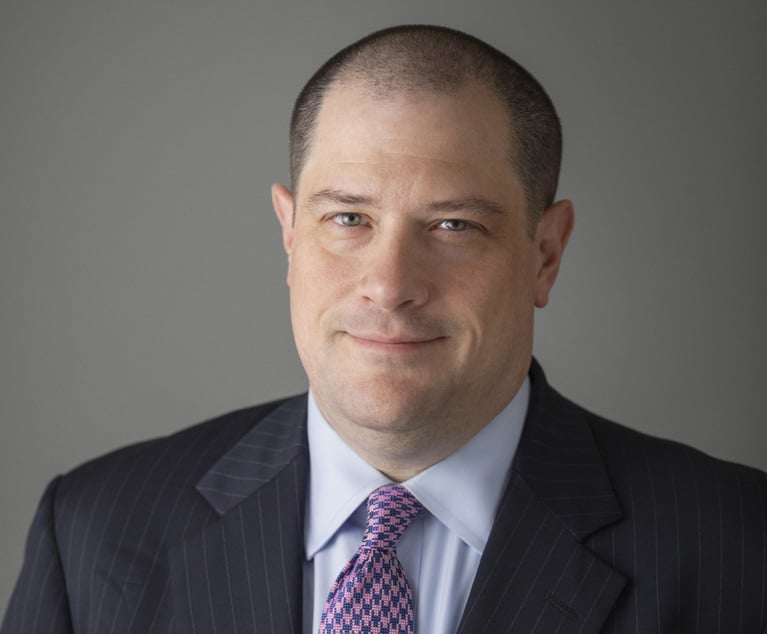 Gen. Daniel Sickles.
Gen. Daniel Sickles.The Spooky Tale of the U.S. Attorney Who Haunts DC—And Gave Us the Insanity Defense
According to local D.C. lore, a ghost of U.S. Attorney Philip Barton Key II—looking at times like a dark shape or a real person—has been spotted in Lafayette Square, haunting the vicinity of the Federal Circuit courthouse.
October 31, 2018 at 11:37 AM
6 minute read
Imagine this: What if the U.S. attorney for the District of Columbia was having an affair with the wife of a member of Congress from New York?
And also, what if the U.S. attorney's uncle was a U.S. Supreme Court justice?
And then, what if the NY congressman learned of the affair and in a jealous rage shot and killed the U.S. attorney in broad daylight in Lafayette Square, right in front of the White House?
Think of the headlines. The cable news. The tweets.
The thing is—it really happened. In 1859, Congressman Daniel Sickles of New York murdered U.S. Attorney Philip Barton Key II. Key's father was Francis Scott Key (as in “The Star Spangled Banner”) and his uncle was the fifth U.S. Supreme Court chief justice, Roger Taney.
According to local D.C. lore, Key's ghost—looking at times like a dark shape or a real person—has been spotted in Lafayette Square, haunting the vicinity of the Federal Circuit courthouse. (As if appellate patent arguments aren't scary enough on their own.)
It gets crazier—pun intended. At trial, Sickles pleaded not guilty by reason of temporary insanity and was acquitted. It was the first time the defense was used successfully in the United States.
The lawyers who got him off? Edwin Stanton, who went on to be Secretary of War during most of the Civil War, and was then appointed to the U.S. Supreme Court, only to die a few days later. Also on the team: James T. Brady, who tried 52 criminal cases and only lost one, and attorneys John Graham, Daniel Ratcliffe, Allan Magruder, Samuel Chilton and Phillip Phillips.
Forget O.J. This was the original “trial of the century.”
A little background.
Key, then 42, was a widower and had been described as “the handsomest man in Washington” by a society hostess.
He began having an affair with Teresa Sickles, the socially prominent young wife of the second-term congressman from New York, who was a close confidant of then-President James Buchanan.
Apparently Key would rent a room at the Cosmos Club across Lafayette Square from the Sickles' house and watch through his opera glasses for Teresa to signal from the window for a tryst.
 Sickles (who also had a reputation as a ladies man) was tipped off by an anonymous letter. He confronted his wife, who tearfully confessed to “an intimacy of an improper kind” before swooning, per reports at the time.
Sickles (who also had a reputation as a ladies man) was tipped off by an anonymous letter. He confronted his wife, who tearfully confessed to “an intimacy of an improper kind” before swooning, per reports at the time.
The bout of “temporary insanity” didn't strike until a three days later, when Sickles saw Key skulking around in front of his house, waving a white handkerchief as a signal to Teresa.
Sickles flew into a rage, grabbed three pistols and shot him multiple times, shouting “Key, you scoundrel, you have dishonored my home—you must die!”
Then he picked up Key's opera glasses and turned himself in to U.S. Attorney General Jeremiah Sullivan Black. “He stoutly declined bail, declaring that his only wish was a swift trial. If the Congressman suspected his incarceration would not hurt his cause, he was right,” wrote historian Thomas Fleming.
Sickles was held in the warden's quarters (the jail had bedbugs), and was visited by members of the House and Senate. He even had the company of his dog, Dandy.
The public was sympathetic. “No one believed a jury would, or should, find Sickles guilty of first-degree murder,” wrote journalist/historian Alexis Coe.
On Monday, April 4, 1859, the trial began. According to Edward W. Knappman's Great American Trials, “Of the first 75 potential jurors called, 72 openly sympathized with Sickles. Some 200 were excused for pro-Sickles bias before a jury of tradesmen and farmers could be impaneled.”
Sickles attorney John Graham's opening statement lasted two days. “He meticulously laid out the evils of adultery, quoting Shakespeare's Othello on the agony of discovering the (supposed) infidelity of one's wife,'” Coe wrote. “Graham made a clear distinction between murder, which is committed with malice aforethought, and manslaughter, which is committed in 'a state of heat…the heat of passion that ought to be, but is not, controlled.'”
The prosecutor, hopelessly outmatched, was Robert Ould. “Key's meek and untalented former assistant had little heart for his arduous and unpopular task. Ould inspired so little confidence in Key's relatives that they insisted he take on James Carlisle as assistant counsel, paying his fee out of their own pockets,” Knappman wrote.
The defense made the case all about Key—the cad who seduced his friend's wife—but the prosecutors failed to turn the tables on Sickles and his philandering.
Instead, they argued in vain that the crime was calculated, that Sickles “had come to that carnival of blood fully prepared,” Ould said.
Defense witnesses included the former Secretary of the Treasury, Robert Walker, who according to Coe “described his old friend on the day of the murder as emitting 'an agony of unnatural and unearthly sounds,' fearing 'if it lasted much longer he must become insane.' Halfway through Walker's testimony, Sickles burst into tears and it took three men, including his father, to help him leave the courtroom.”
According to court records, Brady instructed the jury that if they believed Sickles “became, or was mentally incapable of governing himself in reference to Mr. Key as the debauchee of his wife,” then that means “he is not guilty of any offence whatever.”
It took the jury just 30 minutes of deliberations to agree.
After Sickles was acquitted, the courtroom broke into applause. But his public support evaporated when he announced that he forgave his wife. He became an outcast.
No happy endings for anyone, I'm afraid.
As for the legacy of the case, insanity endured as a sometimes dubious defense until 1984, when Congress passed the Insanity Defense Reform Act, making it far more difficult to successfully invoke.
|We hope you enjoyed this excerpt from Litigation Daily, the exclusive source for sharp commentary on mega court battles, winning strategies and the issues that obsess elite litigators. Click here to subscribe.
This content has been archived. It is available through our partners, LexisNexis® and Bloomberg Law.
To view this content, please continue to their sites.
Not a Lexis Subscriber?
Subscribe Now
Not a Bloomberg Law Subscriber?
Subscribe Now
NOT FOR REPRINT
© 2024 ALM Global, LLC, All Rights Reserved. Request academic re-use from www.copyright.com. All other uses, submit a request to [email protected]. For more information visit Asset & Logo Licensing.
You Might Like
View All
Protecting Attorney-Client Privilege in the Modern Age of Communications
6 minute read

Lingering Questions at Supreme Court About Climate Change Litigation Need Resolution
6 minute read
Trending Stories
- 1What to Know About Naming a Law Firm
- 2Texas Shows the Way Forward in Resolving Mass Tort Gridlock
- 3Ninth Circuit Rules on Inherent Authority and FRCP 37(e)
- 4Where CFPB Enforcement Stops Short on Curbing School Lunch Fees, Class Action Complaint Steps Up
- 5Appellate Court's Decision on Public Employee Pension Eligibility Helps the Judiciary
Who Got The Work
Michael G. Bongiorno, Andrew Scott Dulberg and Elizabeth E. Driscoll from Wilmer Cutler Pickering Hale and Dorr have stepped in to represent Symbotic Inc., an A.I.-enabled technology platform that focuses on increasing supply chain efficiency, and other defendants in a pending shareholder derivative lawsuit. The case, filed Oct. 2 in Massachusetts District Court by the Brown Law Firm on behalf of Stephen Austen, accuses certain officers and directors of misleading investors in regard to Symbotic's potential for margin growth by failing to disclose that the company was not equipped to timely deploy its systems or manage expenses through project delays. The case, assigned to U.S. District Judge Nathaniel M. Gorton, is 1:24-cv-12522, Austen v. Cohen et al.
Who Got The Work
Edmund Polubinski and Marie Killmond of Davis Polk & Wardwell have entered appearances for data platform software development company MongoDB and other defendants in a pending shareholder derivative lawsuit. The action, filed Oct. 7 in New York Southern District Court by the Brown Law Firm, accuses the company's directors and/or officers of falsely expressing confidence in the company’s restructuring of its sales incentive plan and downplaying the severity of decreases in its upfront commitments. The case is 1:24-cv-07594, Roy v. Ittycheria et al.
Who Got The Work
Amy O. Bruchs and Kurt F. Ellison of Michael Best & Friedrich have entered appearances for Epic Systems Corp. in a pending employment discrimination lawsuit. The suit was filed Sept. 7 in Wisconsin Western District Court by Levine Eisberner LLC and Siri & Glimstad on behalf of a project manager who claims that he was wrongfully terminated after applying for a religious exemption to the defendant's COVID-19 vaccine mandate. The case, assigned to U.S. Magistrate Judge Anita Marie Boor, is 3:24-cv-00630, Secker, Nathan v. Epic Systems Corporation.
Who Got The Work
David X. Sullivan, Thomas J. Finn and Gregory A. Hall from McCarter & English have entered appearances for Sunrun Installation Services in a pending civil rights lawsuit. The complaint was filed Sept. 4 in Connecticut District Court by attorney Robert M. Berke on behalf of former employee George Edward Steins, who was arrested and charged with employing an unregistered home improvement salesperson. The complaint alleges that had Sunrun informed the Connecticut Department of Consumer Protection that the plaintiff's employment had ended in 2017 and that he no longer held Sunrun's home improvement contractor license, he would not have been hit with charges, which were dismissed in May 2024. The case, assigned to U.S. District Judge Jeffrey A. Meyer, is 3:24-cv-01423, Steins v. Sunrun, Inc. et al.
Who Got The Work
Greenberg Traurig shareholder Joshua L. Raskin has entered an appearance for boohoo.com UK Ltd. in a pending patent infringement lawsuit. The suit, filed Sept. 3 in Texas Eastern District Court by Rozier Hardt McDonough on behalf of Alto Dynamics, asserts five patents related to an online shopping platform. The case, assigned to U.S. District Judge Rodney Gilstrap, is 2:24-cv-00719, Alto Dynamics, LLC v. boohoo.com UK Limited.
Featured Firms
Law Offices of Gary Martin Hays & Associates, P.C.
(470) 294-1674
Law Offices of Mark E. Salomone
(857) 444-6468
Smith & Hassler
(713) 739-1250









